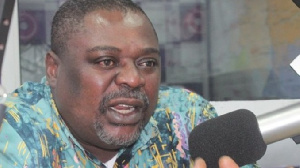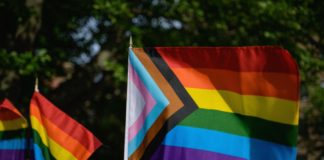• Koku Anydoho believes LGBTQ+ traits can be reversed medically
• The former NDC Deputy Organiser has declared support for the anti
• LGBTQ+ Bill pending before Parliament
Former Deputy General Secretary of the opposition National Democratic Congress, Samuel Koku Anyidoho says the decision by some individuals categorise themselves as LGBTQ+ is borne out of a hormonal disorder that can be corrected medically.
Speaking in an interview with Okay FM monitored by GhanaWeb, Mr Anyidoho stated that the argument in favour of LGBTQ+ rights lacks both scientific and spiritual support.
“To be born as a man and for you to look into a mirror and say you are a woman, there is some hormonal defect somewhere, and there is science and medical evidence that those issues can be solved clinically and medically. These transgender people go to hospitals for them to be injected in their butts and breast with hormones so they become women. So if you can go to a medical center for them to pump those hormones into your system, does it not stand to reason that you can go to the same medical center and they will take out the same hormones and heal you?
“Apart from the spiritual aspect that some people try to downplay it because they don’t believe in the Bible, what about the science of it? If you don’t believe in spirituality what about the science of it?” he directed a question at some 15 personalities fighting against the passage of an anti LGBTQ+ bill pending before the Parliament of Ghana.
When the parliament of Ghana reconvenes on October 26, 2021, one of the first things it will consider as part of its businesses is a bill that will unequivocally criminalize LGBTQ+ activities if passed.
The 38-page bill before parliament, among other things, stipulates that, people of the same sex who engage in sexual intercourse are “liable on summary conviction, to a fine of not less than seven hundred and fifty penalty units and not more than five thousand penalty units, or to a term of imprisonment of not less than three years and not more than five years or both.”
The Bill targets persons who “hold out as a lesbian, a gay, a transgender, a transsexual, a queer, a pansexual, an ally, a non-binary or any other sexual or gender identity that is contrary to the binary categories of male and female.”
The Bill also targets promoters and advocates of LGBTQ+ rights including “a person who, by use of media, technological platform, technological account or any other means, produces, procures, markets, broadcasts, disseminates, publishes or distributes a material for purposes of promoting an activity prohibited under the Bill, or a person uses an electronic device, the Internet service, a film, or any other device capable of electronic storage or transmission to produce, procure, market, broadcast, disseminate, publishes or distribute a material for purposes of promoting an activity prohibited under the Bill” as well as a person who “promotes, supports sympathy for or a change of public opinion towards an act prohibited under the Bill.”
As part of its provisions, the Bill outlines that a flouter can be sentenced to a jail term of not less than six years or not more than ten years imprisonment.
At the back of the public support the Bill has received, a group of academicians and other professionals have expressed their opposition to the bill.
According to the group of 18, the bill, Promotion of Proper Human Sexual Rights and Ghanaian Family Values Bill, when passed into law, would erode a raft of fundamental human rights, as enshrined in the 1992 Constitution.
Members of the group opposing the anti-gay bill include Mr Akoto Ampaw; author, scholar and former Director of the UN Economic Commission for Africa, Prof. Emerita Takyiwaa Manuh; a communications and media expert, Prof. Kwame Karikari; the Dean of the University of Ghana (Legon) School of Law, Prof. Raymond Atuguba, and the Dean of the University of Ghana School of Information and Communication Studies, Prof. Audrey Gadzekpo.
The Director of the Institute of African Studies, University of Ghana, Professor Dzodzi Tsikata; the Executive Director of the Ghana Centre for Democratic Development (CDD-Ghana), Professor H. Kwasi Prempeh, and a former Executive Director of CDD-Ghana, Prof. Kofi Gyimah-Boadi, are also members of the group.
Others are Dr Rose Mensah-Kutin, Dr Yao Graham, Mr Kwasi Adu Amankwah, Dr Kojo Asante, Mr Kingsley Ofei-Nkansah, Mr Akunu Dake, Mr Tetteh Hormeku-Ajie, Dr Charles Wereko-Brobby, Dr Joseph Asunka and Nana Ama Agyemang Asante.








